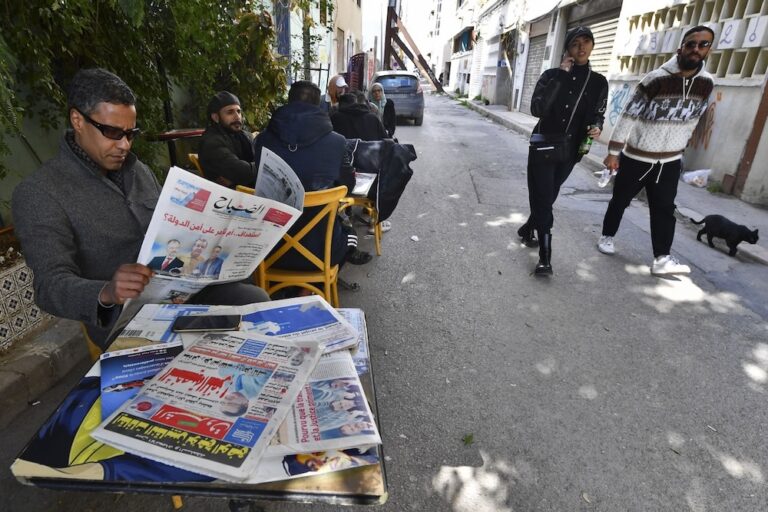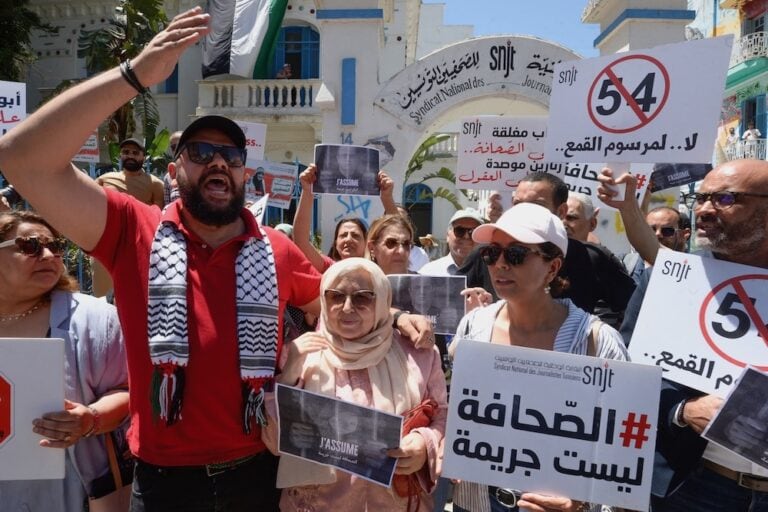Tunisia’s justice minister should ensure the immediate release of Sami Fehri, the director of the privately owned Attounissia TV channel, says Human Rights Watch. Fehri is being held despite a decision by the highest court in Tunisia on November 28, 2012, to quash his indictment and detention order.
(Human Rights Watch/IFEX) – Tunis, December 21, 2012 – Tunisia’s justice minister should ensure the immediate release of Sami Fehri, the director of the privately owned Attounissia TV channel, Human Rights Watch said today. Fehri is being held despite a decision by the highest court in Tunisia on November 28, 2012, to quash his indictment and detention order.
The decision by the Court of Cassation should result in Fehri’s immediate release since the authorities have no further legal authority to detain him, Human Rights Watch said. However, following objections by the public prosecution office, prison authorities have refused to release Fehri, who was accused of embezzlement. Fehri contends that a satirical show mocking leading politicians on his station was the real reason for his arrest.
“Refusing to carry out a ruling by the highest judicial authority undermines the rule of law in Tunisia,” said Eric Goldstein, deputy Middle East and North Africa director at Human Rights Watch.
The Accusation Chamber of the Tunis Appeals Court had indicted Fehri on August 24 for contributing to financial losses at the state-operated National Television Enterprise as a result of malfeasance by an independent TV production company, Cactus Production. The company was controlled at the time of the presidency of Zine el-Abidine Ben Ali, who was ousted in January 2011, by Fehri, and by Belhassen Trabelsi, Ben Ali’s brother-in-law. An investigative judge initiated the inquiry in June 2011. Fehri has been detained since August 28 in the Mornaguia prison, near Tunis.
Fehri was charged with embezzling public funds under article 96 of the penal code, which provides for up to 10 years in prison for any public servant who uses his position to gain unfair advantage for himself or a third party. He was charged as an “accomplice,” while five former directors of National Television were indicted as primary authors of the offense.
Fehri’s indictment and arrest followed Attounissia TV’s broadcast of several episodes of a show called “The Political Logic,” which used puppets that are caricatures of leading national political figures to mock them. The targets included President Moncef Marzouki, Prime Minister Hamadi Jebali and Rached Ghannouchi, leader of the ruling Islamic Ennahda party.
In an internet video broadcast shortly before his arrest, Fehri contended that the airing of “The Political Logic” on his channel was the real reason the government was prosecuting him.
The Court of Cassation’s decision on November 28 to quash the indictment and refer the case back to the Accusation Chamber has the effect of returning the case to the period before the indictment was issued, based on article 273 of the Criminal Procedure Code.
The day of the Court of Cassation decision, the public prosecutor handling Fehri’s case at that court issued a warrant ordering his release. His lawyers and family, who had a copy of the release order, went to Mornaguia that afternoon to await his release.
Fehri’s lawyer, Sonia Dahmani, told Human Rights Watch that the prison director told them that Fehri would be released shortly. However, at around 11:00 p.m., she said, the director told them that he had received a written order from the first deputy public prosecutor at the Cassation Court asking him not to release Fehri because the Cassation Court decision did not encompass the detention order. Fehri’s lawyers asked the Cassation Court to clarify its decision, under article 340 of the Code of Criminal Procedure, which allows parties to petition a court when a dispute arises on the application of a decision by that court.
On December 5, the Cassation Court issued a decision stating that the arrest warrant was part of the decision the court had quashed. However, authorities did not release Fehri. When his lawyers asked the public prosecutor of the Cassation Court to re-issue the release order, he refused and said that the order must come from the Accusation Chamber, because the case was again before it, Dahmani said.
Fehri’s lawyers then went to the public prosecutor of the appeals court, who also said he did not have the authority to issue the order and that they should go to the Accusation Chamber.
However, when the lawyers asked the Accusation Chamber to issue the release order, the chamber issued a decision, dated December 6, declaring that it did not have the authority to issue the order, but that the Cassation Court did.
The lawyers then filed another request to the Accusation Chamber to release their client. But on December 13, the chamber refused to release Fehri, saying it had discretionary power to evaluate the circumstances.
In a TV interview, the Justice Minister Noureddine Bhiri said that the issue was in the hands of the courts and that he had no authority to order Fehri’s release. However, Article 22 of the Criminal Procedure Code gives his ministry authority over the office of the public prosecutor “The public prosecutor is in charge, under the authority of the justice secretary of state, of ensuring the enforcement of the penal law on the whole territory of the republic.” An adviser to the minister told Human Rights Watch on December 20 that the issue was not the enforcement of court decisions but rather a conflict of jurisdiction between the Court of Cassation and the Accusation Chamber over which can decide whether Fehri is to remain in pretrial detention.
Abada el Kefi, a lawyer before the Cassation Court who is not involved in the Fehri case, told Human Rights Watch: “This is unprecedented. In my thirty years of practice I have never seen the decision of a Cassation Court being disregarded in this way.” He said that the prosecutor’s office is required to enforce the decision of the Cassation Court.
Under the Universal Declaration of Human Rights, no one may be subjected to arbitrary arrest, detention, or imprisonment. Detention is arbitrary when there is no legal basis for it.
“Sami Fehri has now been behind bars for three weeks beyond the decision by Tunisia’s highest court quashing his indictment and detention order,” Goldstein said. “The Justice Ministry needs to answer for this apparent subversion of the rule of law.”


